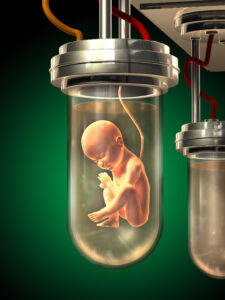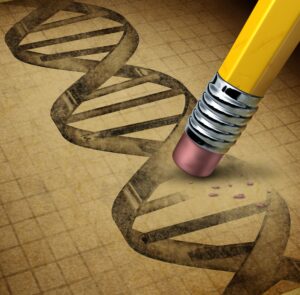In Aldous Huxley’s famous “Brave New World,” he describes a world where human freedom is nonexistent, and government-run infant hatcheries produce society’s children. This was a story written in 1932 depicting our world in 2540… however similar technologies are emerging in healthcare as of recently.
In another post, we covered the possibility of clustered regularly interspaced short palindromic repeats, or CRISPR technology being used to create genetically altered immune cells to fight certain types of cancers. So far it’s a race to see who will conduct the first human trials between the U.S. and China, however it’s certain that research is steadily progressing.
Here we’ll take a look at the other side of the coin – designer babies and how sex may fall to obsoleteness in a world of low-risk and high-reward genetic manipulation.
Race for Editing The Human Race
So far, developments in this field and technology have allowed researchers to remove malaria from mosquito populations, showing similar promise in treating HIV and other diseases and ailments like cancer and blindness.
Remarkably, such a groundbreaking technology as this is actually rather inexpensive and easily replicated without laboratory settings – something both encouraging and concerning for most researchers.
Now, with Sichuan University’s West China Hospital in Chengdu to perform the first CRISPR human trial next month, bioethicists like Hank Greely are leading the discussion over how the ability to alter human DNA will affect our societies and our love lives.
A Better Way to Procreate?
In his book The End of Sex and the Future of Human Reproduction, Greely argues that two different biomedical innovations coming from different directions will combine to make designer babies a commonplace practice.
He says that through our ability to sequence entire genomes and using preimplantation genetic diagnosis, embryo selection will become much more accessible and less risky for couples looking to have a baby.
The key distinction is that these embryos may have traits added or subtracted at the discretion of parents and their advising geneticists or other medical professionals, all made possible through CRISPR gene editing.
And while Greely doesn’t feel that recreational sex is going away anytime soon, the availability and increasing accuracy of this technology may just create the new standard of procreation.
Though from an ethical standpoint, many people are concerned whether CRISPR technology letting humanity come dangerously close with “playing God.” Even by modest predictions, Greely believes that “we’ll be able to take some skin cells from anyone and turn them into any cell type. Make these into eggs or sperm, and that is going to make IVF much easier, cheaper, and less dangerous.”
A World of Designer Genetics
Although it may be a few more decades before we’re safely choosing traits for our children like hair color, height, and perhaps even a higher IQ, many are weary over whether consumer eugenics will improve the health of humanity or create even more complications.
Eugenics itself is a tricky subject, evoking notions of state-enforced reproductive control or even sterilization. Yet, for others it means the ability to raise a child free from debilitating diseases and deformities, something anyone in their right mind would choose given the accuracy of the procedure.
But what happens when socio-economic differences start to affect who has access to such technologies? In a single generation, we may “cut-out” malignant DNA sequences causing cancer, HIV, and other illnesses – but how long until divides emerge between edited and unedited populations?
Given the availability of practices like cosmetic surgery, it seems likely that we may encounter quite a bit of troubleshooting and regulatory considerations before such gene-editing becomes open to consumers.
For now, the world watches as the first adult human trials begin in China next month, all in anticipation of a CRISPR-enhanced future and society.



